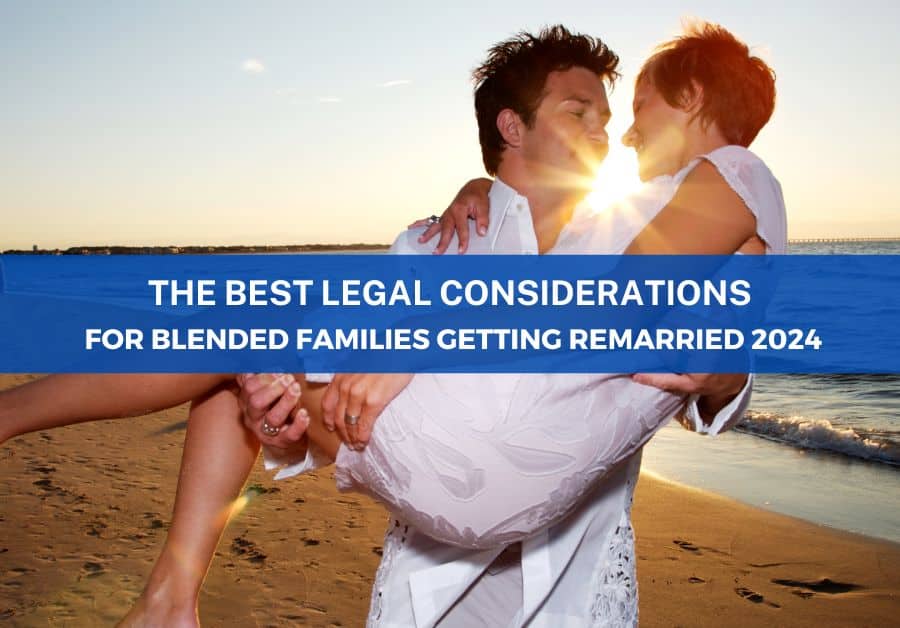
If you’re considering getting remarried and you or your partner have children from previous marriages or relationships, there are some legal considerations you should keep in mind. Blended families can be challenging, but with some preparation, you can navigate these challenges and create a happy home for everyone involved.
One of the most important legal considerations for blended families is estate planning. If you pass away without a valid will, your assets will be distributed according to state law, which may not reflect your wishes. This is especially important if you have children from a previous marriage or relationship, as they may not receive the inheritance you intended for them. By creating a will or trust, you can ensure that your assets are distributed according to your wishes and that your children are provided for.
Another legal consideration for blended families is child custody and support. If you or your partner have children from a previous relationship, it’s important to establish legal custody and support arrangements to protect everyone’s interests. This can be a sensitive issue, but by working with an experienced family law attorney, you can create a custody and support agreement that works for everyone involved.
Understanding Blended Families
When you get remarried, you may find yourself in a blended family. A blended family is a family that includes children from a previous marriage or relationship, as well as children from the current marriage or relationship. Blended families can be wonderful, but they can also present unique challenges.
It is important to understand that blended families are not the same as traditional families. In a traditional family, the parents are biological parents to all of the children in the family. In a blended family, the parents may be biological parents to some of the children, but not all of them. This can create different dynamics within the family.
Blended families can also present challenges when it comes to parenting. In a blended family, you may find yourself co-parenting with your spouse’s ex-partner, or you may be the step-parent to your spouse’s children. This can be difficult, as you may not have the same level of authority as a biological parent. It is important to establish clear boundaries and expectations when it comes to parenting in a blended family.
Another challenge that blended families may face is financial issues. When you get remarried, you may be bringing different financial obligations and assets into the marriage. It is important to discuss these issues openly and honestly with your spouse, and to come up with a plan for managing your finances as a blended family.
Blended families can be a wonderful and rewarding experience. However, it is important to understand the unique challenges that come with being a part of a blended family. By establishing clear boundaries, communicating openly and honestly, and working together as a team, you can create a happy and healthy blended family.
KEY TAKEAWAYS
Legal Aspects of Remarriage

When you are getting remarried, it is important to consider the legal aspects of your new union, especially if you or your partner have children from previous relationships. Here are some legal considerations you should keep in mind:
Marital Property Rights
When you get married, you and your spouse become a legal entity. This means that any property you acquire during your marriage is considered marital property, regardless of who paid for it. If you divorce or one of you dies, this property will be divided according to the laws of your state.
However, if you have children from a previous relationship, you may want to protect their inheritance by keeping some assets separate. One way to do this is by creating a prenuptial agreement.
Prenuptial Agreements
A prenuptial agreement is a legal document that outlines how your assets will be divided in the event of a divorce or death. It can also address other issues, such as spousal support and how debts will be handled.
While some people may feel that a prenuptial agreement is unromantic, it can actually be a practical way to protect your interests and ensure that your children are taken care of. If you are considering a prenuptial agreement, it is important to work with an experienced family law attorney who can help you draft a document that is fair and legally enforceable.
When you are getting remarried, it is important to consider the legal implications of your new union. Marital property rights and prenuptial agreements are just two of the many legal issues you may need to address. By working with an experienced family law attorney, you can ensure that your interests are protected and that your new marriage starts off on the right foot.
Parental Rights and Responsibilities

When you and your partner decide to get remarried, it’s important to consider the legal implications for your children from previous marriages or relationships. As a parent, you have both rights and responsibilities when it comes to your children, and these can be affected by your remarriage. Here are some key considerations to keep in mind:
Child Custody
If you have children from a previous marriage or relationship, you may already have a custody agreement in place. When you get remarried, this agreement may need to be revisited to ensure that it still works for everyone involved. In some cases, you may need to modify the agreement to reflect changes in your family situation.
It’s important to note that getting remarried does not automatically give your new spouse any legal rights to your children. If you want your spouse to have legal custody of your children, you will need to go through the appropriate legal channels to make this happen.
Child Support
If you are currently paying or receiving child support, your remarriage may affect these payments. When you get remarried, your income and expenses may change, which could impact the amount of child support you owe or receive.
It’s important to review your child support agreement with your lawyer to ensure that it still reflects your current financial situation. If you need to modify the agreement, you will need to go through the appropriate legal channels to do so.
Adoption
If your new spouse wants to adopt your children, this can be a great way to solidify your new family unit. However, adoption is a complex legal process that requires careful consideration and planning.
Before pursuing adoption, it’s important to discuss the matter with your children and your ex-spouse (if applicable). You will also need to work with a lawyer to navigate the legal requirements for adoption in your state.
When it comes to parental rights and responsibilities, it’s important to approach the matter with care and consideration. By working with a lawyer and communicating openly with your family, you can ensure that everyone’s needs are met and that your new blended family can thrive.
Estate Planning Considerations

When getting remarried, it is important to consider the legal implications of blending families. Estate planning is a crucial step in ensuring that your assets are distributed according to your wishes after your death. Here are some estate planning considerations to keep in mind:
Wills
A will is a legal document that outlines how your assets will be distributed after your death. When getting remarried, it is important to update your will to reflect your new family situation. If you have children from a previous marriage, you may want to ensure that they receive a portion of your assets. Without a will, your assets will be distributed according to state law, which may not align with your wishes.
When creating a will, it is important to choose an executor who will be responsible for carrying out your wishes. This person should be someone you trust to handle your affairs after your death.
Trusts
A trust is a legal entity that holds assets on behalf of a beneficiary. When getting remarried, a trust can be a useful tool for ensuring that your assets are distributed according to your wishes. For example, you may want to create a trust to provide for your children from a previous marriage while also providing for your new spouse.
There are several types of trusts, including revocable and irrevocable trusts. A revocable trust can be changed or revoked during your lifetime, while an irrevocable trust cannot be changed once it is created. Depending on your situation, one type of trust may be more appropriate than the other.
When creating a trust, it is important to choose a trustee who will be responsible for managing the trust assets. This person should be someone you trust to make decisions in the best interests of the beneficiaries.
Estate planning is an important consideration when getting remarried. Updating your will and creating a trust can ensure that your assets are distributed according to your wishes and that your loved ones are provided for after your death.
Tax Considerations for Blended Families

When getting remarried, it’s important to consider the tax implications of your new family structure. Blended families can be complex, and it’s important to understand how your tax situation may change. Here are some key tax considerations for blended families:
Filing Status
When you get remarried, you’ll need to decide whether to file your taxes jointly or separately. Generally, filing jointly will result in a lower tax bill, but it’s important to consider all factors before making a decision. For example, if one spouse has a significantly higher income than the other, filing separately may result in a lower tax bill overall.
Claiming Dependents
If you have children from a previous marriage, you’ll need to decide who can claim them as dependents on their tax return. Generally, the custodial parent (the one with whom the child lives for the majority of the year) will claim the child as a dependent. However, it’s important to note that the custodial parent can transfer the right to claim the child to the non-custodial parent by signing IRS Form 8332.
It’s also important to note that if you have stepchildren, you cannot claim them as dependents unless you legally adopt them. However, you may be able to claim them for the Child Tax Credit or the Credit for Other Dependents if they meet certain criteria.
Insurance Considerations

When getting remarried, there are various legal considerations to keep in mind, including insurance. Here are some key insurance considerations to keep in mind:
Health Insurance
When getting remarried, you may need to evaluate your health insurance options. If both you and your new spouse have health insurance, you may need to decide which plan to keep or if it makes sense to combine your coverage. If you have children from a previous marriage, you may need to consider their health insurance coverage as well.
Before making any changes to your health insurance coverage, it’s important to review the details of each plan, including deductibles, co-pays, and covered services. You should also consider any pre-existing conditions you or your spouse may have, as well as any prescription medications you may be taking.
Life Insurance
Another important insurance consideration for blended families is life insurance. If you have children from a previous marriage, you may want to ensure that they are provided for in the event of your death. Life insurance can help provide financial support for your children and your new spouse.
When evaluating life insurance options, consider the amount of coverage you need, as well as the type of policy that makes the most sense for your situation. For example, term life insurance may be a good option if you only need coverage for a specific period of time, such as until your children are grown. On the other hand, permanent life insurance may be a better option if you want coverage for your entire life.
It’s also important to review any existing life insurance policies you or your new spouse may have. You may need to update beneficiaries or make other changes to ensure that your blended family is properly protected.
What’s New in 2024
In 2024, our guide undergoes a transformative update, addressing the unique legal considerations of blended families entering remarriage. Fresh insights delve into evolving legal landscapes, covering nuanced issues such as shared assets, custody, and inheritance. We introduce innovative strategies for navigating complex familial dynamics, ensuring legal clarity and harmony. The guide now emphasizes digital considerations, reflecting the contemporary challenges of the online world. With an increased focus on individual family needs, our 2024 update paves the way for a remarriage that is not only legally secure but tailored to the specific dynamics of blended families.
Frequently Asked Questions
Q1
A1
Q2
A2
Q3
A3
Q4
A4
Conclusion
In conclusion, getting remarried can be a challenging time for blended families, but with the right legal considerations, you can make the process smoother for everyone involved. Remember to discuss important issues with your partner, such as prenuptial agreements, estate planning, and child custody arrangements.
It’s also important to seek legal advice from experienced professionals, such as family law attorneys and estate planners, who can help you navigate the complexities of blended family legal matters. They can provide you with the necessary guidance and support to ensure that you and your family’s legal interests are protected.
Additionally, maintaining open communication with your partner and children is crucial during this time. By discussing your expectations and concerns, you can help your family adjust to the changes that come with a blended family.
Finally, remember that every blended family is unique, and there is no one-size-fits-all solution to legal considerations. Take the time to consider your family’s specific needs and work with legal professionals to create a plan that works for everyone. With the right preparation and support, you can create a happy and harmonious blended family.







